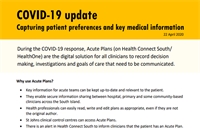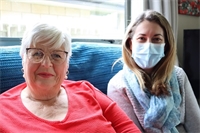15Mar
Access to Health Connect South and HeathOne via Ambulance tablets for Paramedics ICPs and ECPs
Paramedics, Intensive Care Paramedics (ICPs) and Extended Care Paramedics (ECPs) across the South Island now have access to Health Connect South (HCS) and HealthOne.
This means paramedics will have a greater understanding of the patient’s background to help guide treatment decisions and allow for more robust clinical decision making on whether the patient should be transported to an Emergency Department (ED), managed in primary care, or remain the in the community.
Paramedics are almost the only health professionals providing urgent, unplanned care in the out-of-hospital setting, seeing and treating approximately 1,475 additional patients per week in their home nationally. Previously paramedics have not had point of care access to shared health information which has added complexity to patient assessment and decision-making regarding treatment which can result in unnecessary transports to health facilities.
Benefits to the ambulance service
- Greater understanding of the patient’s background to guide treatment decisions.
- Allows for more robust clinical decision making on whether the patient should be transported to an ED or managed in the community.
- Efficient access to acute plans, advance care plans and crisis plans to enable prompt and appropriate management for these complex patients.
- Reduction in calls to the Clinical Desk allowing clinical desk personnel to manage the increased ambulance workload as more people call 111.
Health system benefits
- Reduction in transportation to ED by ambulance, reducing the strain on EDs and the hospital system.
- Patients being able to access the right care, closer to home without transport to hospital.
- Reduced need for patients to visit their GP or an urgent care clinic for simple clinical problems that are known to be normal for the patient, supporting the capacity of primary care.
Benefits to the patient
- Comprehensive and safer treatment, transport, and referral decisions.
- Complex patients not having to repeatedly explain extensive detailed history which can be frustrating for them.
- Efficient access to acute plans, advance care plans and crisis plans to enable prompt and appropriate management for these complex patients.
- All health providers in the patient's clinical course have access to their health information allowing for consistency and improved collaboration.
This is a huge step forward for prehospital care and has the ability to enhance our patient’s experience. Having access to HealthOne at point of care will allow Paramedics a greater understanding of the patient’s medical history, help guide treatment decisions, and allow for more robust clinical decision making on whether the patient should be transported to an Emergency Department (ED), managed in primary care, or remain the in the community.
For more information contact Orla Fowden, Right Care Advisor (South), St John at Orla.Fowden@stjohn.org.nz
About the Author
Related

The newest in the suite of electronic shared care plans, the Personalised Care Plan (PCP), goes live...
Read More >

Since COVID-19 first reached our shores, the way we use technology to support patients has been firm...
Read More >

During the COVID-19 response, Acute Plans (on Health Connect South/ HealthOne) are the digital solut...
Read More >

Pasifika elders and health and wellbeing services participated in a Pasifika Matua Fono (elder's...
Read More >

When you’re not well it can be stressful and communicating is not always easy, which can sometimes ...
Read More >

Jennifer Voice is feeling well cared for this winter, thanks to the support of the Care Coordination...
Read More >